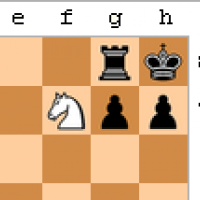
Strategy, tactics, the psychological and the logical
Banjoman writes in response to a blog claiming that strategy guides tactics:
"Sorry, but if the goal of chess is to checkmate your opponent, and if checkmating your opponent is a tactical operation, then tactics guides strategy, rather than the other way around."
Good point. A similar way of thinking of the issue is that, if Steinitz is wrong in claiming that perfect play by both sides leads to a draw, and if white should win every time with perfect play, then the entire chess game would simply be one big tactical operation that leads to 1-0.
"Strategy" is a purely human, psychological operation of long-term planning which can be applied to a number of situations including war, corporate management, politics, dating or chess. Tactics are purely logical combinations in chess or tricks of war or tricks of dating, which tend to be (but need not be) instances of short-term planning or, more accurately in chess, pure calculation. The most successful computers, which surely destroy most humans, do not make use of ANY strategy--they are programmed solely and entirely for tactics. Computers don't plan ahead, they simply calculate ahead, using the brute force of calculation to make moves that give us humans the illusion that computer play has careful, long-term planning. But it is our interpretation of the computer's logical power that it is 'planning', when planning is a psychological operation that computers are incapable of. indeed, if Steinitz theory of perfect play is true, then the computer need only be tactically superior enough to be able to play out the enormous tactics required for the game to end in a draw. And if Steinitz theory of perfect play is false, then the computer need only be tactically superior enough to play out the tactics required to guarantee a win.
This is not surprising since chess is purely formal, ie, logical, and tactics in chess are purely logical combinations involving exchange of material, or mate (ie, the smothered Q+Knight mate).
So the question, "Does strategy guide tactics or do tactics guide strategy?" is a false dichotomy. For computers, there is no strategy behind their play, just tactics. For human beings, strategy, sometimes, is a helpful psychological operation in our playing chess. But there are many games where humans can get by without any strategy, simply by responding to blunders of the opponent which offer tactical opportunities for a quick win.
the more interesting point is that Steinitz perfect play conjecture is irrelevant to strategy, and strategy is merely a feature of the human element of playing chess. Good strategy can help humans set up positions where the tactics can work out in their favor, but a strong human player, perhaps an autistic savant (who are notoriously bad at planning) could easily crush most humans if the savant could play computer-style, tactical chess.
the upshot of this discussion is that strategy is psychological, chess is logical, tactics are logical and though strategy is useful for humans, it is not necessary for playing the game at the highest levels, as demonstrated by computers.